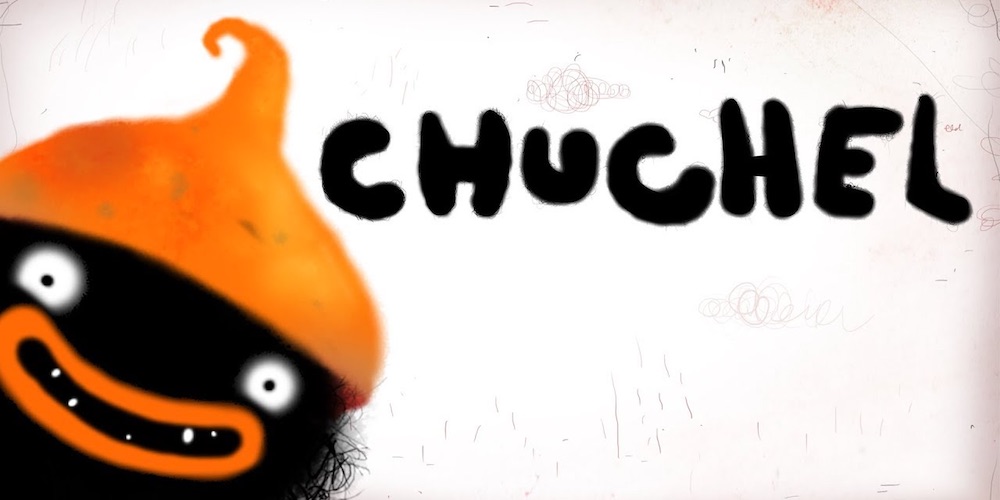
Chuchel is a children’s cartoon dressed up as a point and click adventure. Scene after scene, the player helps a ball of hair and their rodent-like rival get back their beloved cherry, only for it to be taken away again. It’s the latest from Amanita Design, the small Czech studio responsible for the Samorost games, as well as Machinarium and Botanicula. That last title is the one to pay attention to here – Botanicula’s lead designer, Jaromír Plachý, has another turn at the helm with Chuchel, and it likewise features the gloriously twee psych-folk stylings of the band DVA. However, Chuchel represents a slight but noticeable change of tack for Amanita: it is unapologetically the easiest, lightest and most child-friendly of their frequently cute-in-appearance but tough underneath catalogue. It’s the first to really cross territory from “a game that looks like it could be for children” to “a game that is actually for children.” Depending on where you sit – perhaps whether or not you are or have a child – this could mean it’s either brilliant or something you might want to pass on.
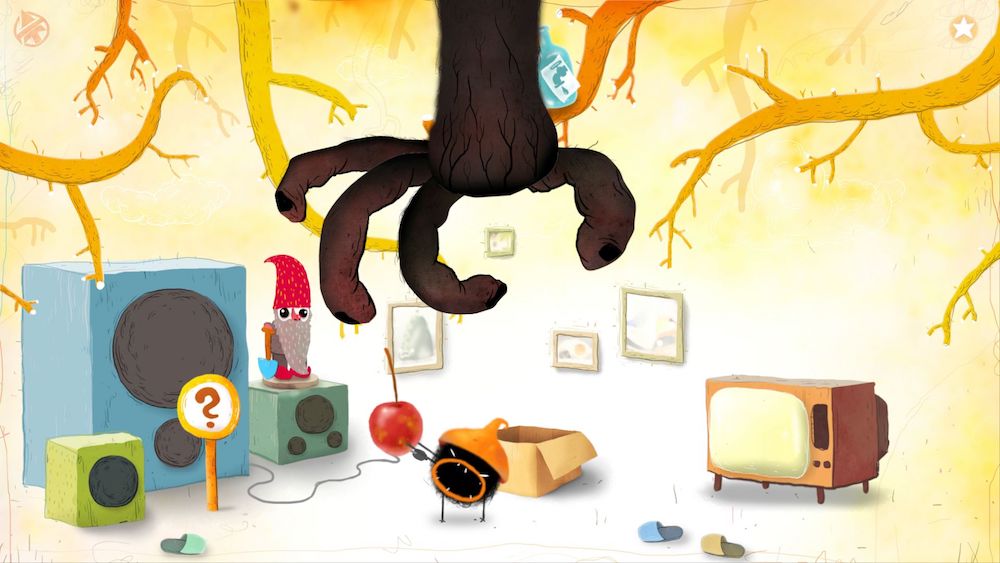
Progression through the game is a mixed bag of simple tricks. The player finds the solution by clicking characters and items, choosing actions, solving the occasional environmental puzzle. There is very little item collecting. Sometimes the scene is as straightforward as clicking the one clickable object over and over again, seeing a series of gags spill out until it cycles to the solution. There’s also the occasional minig-ame – little spoofs/tributes to your Pacmans and Tetris’, as well as equally familiar if less specifically pop-cultural activities like a rotating maze and a snail race.
It’s mostly easy fun for everyone. The puzzles (as often with Amanita’s games) are unapologetically trial and error in nature, and a bit unintuitive. Fortunately, this works to the game’s advantage, as a lot of enjoyment in Chuchel comes from just testing every option and appreciating whatever joke comes out of it. This setup has its limitations. I mean, there’s only so many times a character getting squished inexplicably or raging out can be funny. Also in some of the longer puzzles where you have to rearrange and manipulate several different props correctly, the jokes dry up entirely, and the process gets a bit tedious.
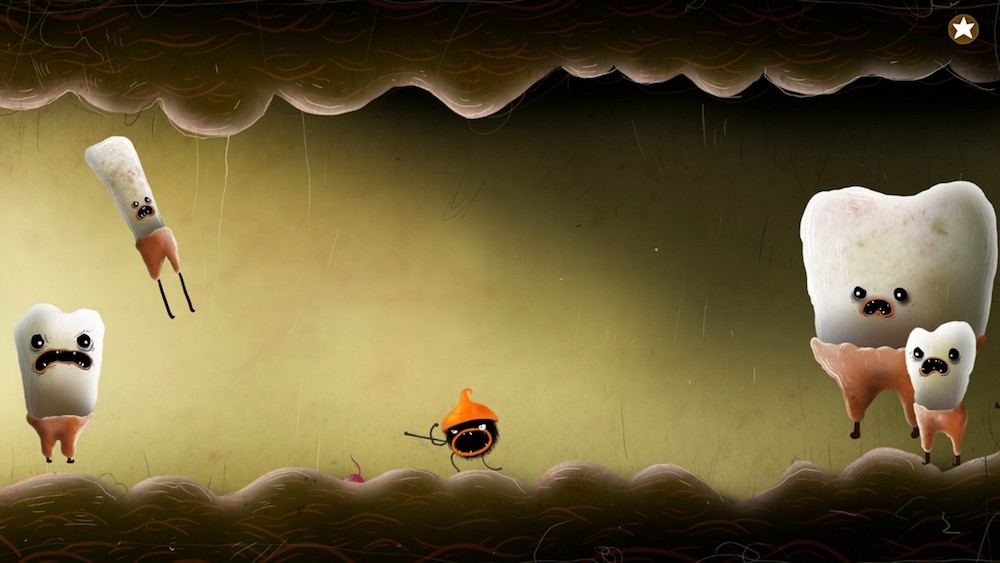
Chuchel takes its cues largely from TV, and the recurring structure feels old and embedded in Saturday afternoons of another time and place. While this is nostalgic for me, for the game it is mostly functional, justifying a segmented structure and a lack of developed plot. Backgrounds are largely blank, faintly graded brown or plain off-white, making most objects in the game seem like props on a TV-set. There’s rarely a sense of continuity. The game is like a series of skits where the ball of hair and the rodent compete (or sometimes work together) to get the cherry back from whoever happens to be standing in their way (e.g. a tree, a large mould of jelly, a yeti, a team of weary bathroom utensils). Much as it was in cartoons of yore, often there’s little explanation as to why and how the characters lose the cherry between scenarios, beyond an intervening hand that reaches from above to snatch it and move the action along.
Despite the bare backgrounds it otherwise looks great. Scenes are well-worked minimalist design, with lovely bright colours, little clutter, few things to erroneously spend energy optimistically clicking on. Cartoony weird creature design has always been one of Amanita’s great strengths, and here this is taken to another level as the game sprints through a bucketful of strange, funny and half-familiar NPCs. The quaint, energetic music of DVA acts as a great foil to the incoherent mumblings that stand in for dialogue, propping up a totally non-verbal adventure. There’s something warming about seeing this kind of thing come together effectively.
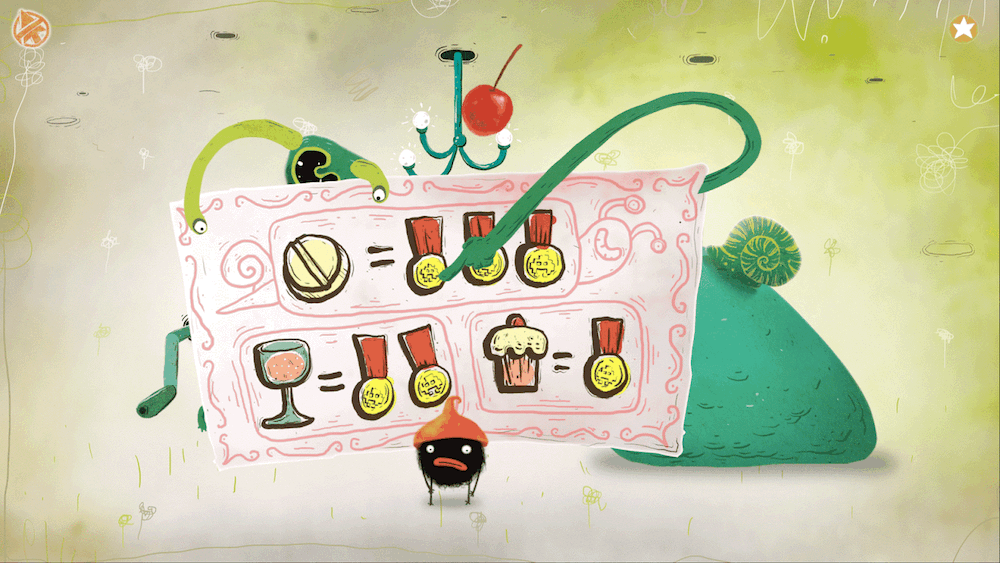
The game walks that tricky rope of having qualities that us adult-folk might appreciate while still being essentially for kids. The humour is endearing but good-natured, leaning on physical comedy and instances of the weird and unexpected. I genuinely laughed out loud a good dozen times, which isn’t a bad result for a game that only takes a couple of hours to get through. On the other hand, I found it tough to play for more than half an hour at a stretch, just as I probably wouldn’t want to marathon two hours of Tom & Jerry.
Still, I’ve long been a sucker for Amanita’s gift for effective storytelling through aesthetic world-building, so I can’t help but admit a bit of disappointment that here neither world nor story is much of a consideration. In the past they’ve been excellent at creatively upending notions of the familiar and strange. Here with the studio-like game setting, the world feels less immediate, the structure more front-and-center, and so the adventuring feels inconsequential. I understand why Chuchel has to be like this, and in some ways, it really is the purest expression of design that Amanita have made so far. But it comes with limitations, and I feel like it’s difficult to wholesale recommend.
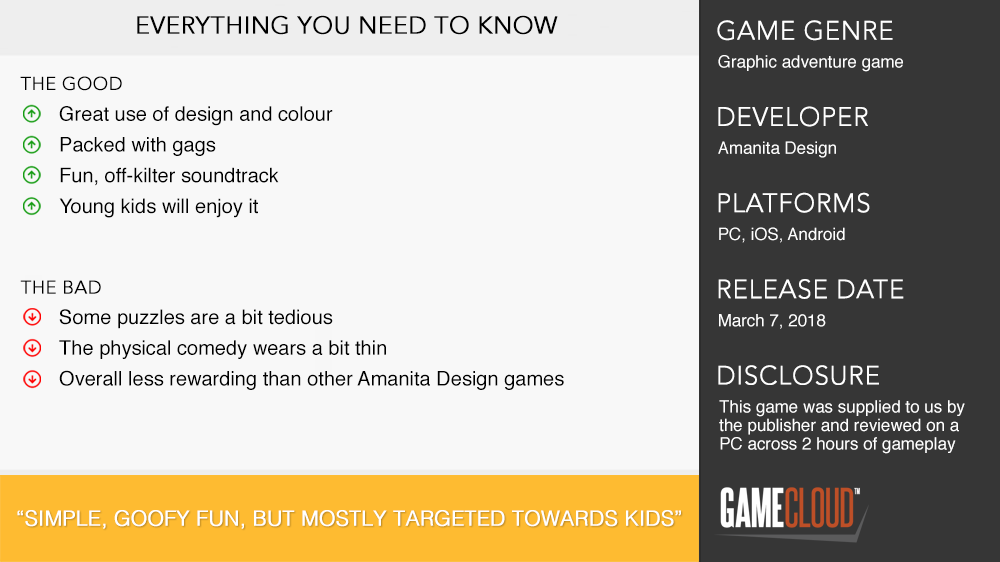
Chuchel is absolutely a game you might want to pick up if you have young kids, or if you want a couple of hours of good, unbridled cartoon humour. It’s otherwise not essential. Fans of Amanita’s other games may find something to like here, but also something lacking. For others, give your time to Amanita’s older titles first, particularly Botanicula and the Samorost series. These showcase a similar vein of creativity and humour to Chuchel but are overall more affecting and rewarding, if not quite as thematically or functionally child-friendly.











